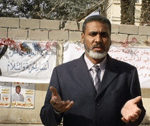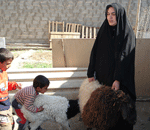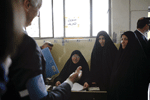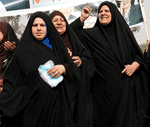Iraq
Published on Thu, 2013-11-28 22:08
Hanaa Edwar, secretary general of Al-Amal Association, the Iraqi member of Social Watch has been named “Arab Woman of the Year 2013” by Takreem for her distinctive hard work, courage and successes in the field of civil society and human rights for equality, women's rights, and the empowerment of women to participate effectively in society and political life.
In her speech at the award ceremony, Hanaa Edwar expressed her thanks, deep gratitude to Takreem, and stressed her sense of greater responsibility beyond the borders of her homeland. She also thanked her colleagues at Iraqi Al-Amal Association and many civil society organisations for the support and assistance she received during her work, who,together, planted the seeds of hope in the wounded Iraq.
|
Published on Sun, 2013-07-21 00:00

Photo: Iraqi Al-Amal
Association
|
The "Arab NGO Network for Development (ANND)", in partnership with the "CSOs Partnership for Development Effectiveness” and ”Iraqi Al-Amal Association”, and in collaboration with the Parliament of Iraqi Kurdistan Region and the ICNL, organised the Regional Conference for the Arab Region on the Effectiveness of Development, in Erbil on 22 and 23 June, 2013.
This Conference comes in the context of the “development effectiveness”, which was launched in 2003 at the first meeting organised by the Organisation for Economic Cooperation for Development in Rome, to discuss how to make the development aid more effective. The conference was followed by a meeting in France in 2005 which resulted in the Paris Declaration on Aid Effectiveness. In this meeting, and for the first time, a set of principles were discussed, including the principle of partnership between donors and beneficiaries, the principle of consistency between the policies and directions of the donors to avoid duplication and the discrepancies in standards, the principle of compatibility with public policies and national needs in the beneficiary country, as well as the principle of democratic ownership, including the ownership of decision, and avoid linking development aid with conditions on the policies.
|
Published on Wed, 2013-05-01 13:04

Jalal Dhiyab
|
Representatives of civil society organizations; the signatories of this appeal, condemn the assassination in Basrah on 26 April 2013 of the activist, Jalal Dhiyab; the President of the Supporters Humanitarian Liberty Association, one of the outstanding defenders of human rights in Iraq, who has devoted much of his life to defend black rights for full citizenship, and his legitimate claim to address the culture of discrimination and the rights of black citizens in political representation and participation in public life, draw a road map for the achievement of equality and the promotion of political representation and participation in public life, draw a road map for the achievement of equality and the promotion of citizenship rights for all components in the process of building a democratic system in Iraq.
|
Published on Fri, 2012-12-14 08:45

Iraqi widow with her sons.
(Photo: CODEPINK Women
For Peace/Flickr/CC)
|
Political disputes and security challenges have hindered the stability required for the development of Iraq, according to the Iraqi Al Amal Association’s contribution to the Social Watch Report 2013. To get on the right track, says Al Amal, the Iraqi government must conduct the census that has been delayed since 2007, to collect reliable information for the design of comprehensive, effective and appropriately funded development plans.
|
|
During the last 10 years, Iraq has undergone dramatic changes of rulers, but the much-expected transition to democracy failed to pave the way for development. Although the government issued in 2009 a strategy for poverty reduction, the efforts, resources and following-up have not been enough to see noticeable results on the ground.
|
Published on Thu, 2012-07-19 10:12

Iraqi elections officers discussing
with UNAMI representative.
(Rick Bajornas/UN Photo)
|
As the Security Council is discussing the renewal of the mandate of the United Nations Assistance Mission for Iraq this month, concerns remain regarding political consolidation and reconciliation efforts. Women’s rights remain at risk, and their voices are still not adequately heard in the political realm. The issue was debated in the panel discussion held in New York on 9 July 2012 by Hana Edwar, Founder and Secretary-General, Iraqi Al-Amal Association and Ms. Raz Rasool, Founder, Kurdistan Business Women Association.
|
Published on Tue, 2012-06-12 08:23

Hanaa Edwar, interviewed by
Euronews. (Image: Euronews)
|
With insecurity and economic hardship, Iraqis are still paying the price of years of oppression and war, and women carry a heavy burden. Human rights activist Hanaa Edwar has never stopped fighting for women’s rights, said reporter Valerie Gauriat in a special coverage for Euronews TV network.
|
Published on Wed, 2012-02-08 12:21

Iraqi women chant campaign
slogans. (Photo: Al Jazeera English
/Flickr/CC)
|
Members of the Iraqi Parliament promised to make serious efforts to approve laws in order to ensure all women the enjoyment of their social and economic rights, guaranteed by the Constitution, at the request of Iraqi Al-Amal Association, focal point of Social Watch in that country.
|
|
After decades of war, neglect and mismanagement, the country’s social and environmental situation is critical.
Iraq continues to struggle with an unstable government, corruption, and vast human rights abuses, including attacks on minority groups. Until greater levels of peace and security are achieved, progress in terms of creating and utilizing a successful sustainable development model will prove difficult. While there is increasing civil society participation and democratic involvement, repression and human rights abuses demand persistent attention in order to guarantee a democratic future.
|
Published on Fri, 2011-09-23 11:22

Hanaa Edwar in Stockholm
(Photo: Hanna Navier/Kvinna till Kvinna)br>
|
Sources: International Peace Bureau, Kvinna till Kvinna, IPS
On October 29 Hanaa Edwar will receive the Sean MacBride Peace Prize in Potsdam, Germany, but she will not rest until seeing her efforts crowned in Iraq. “I have to do this for the Iraqi people. We continue to fight for peace, equality and democracy,” said Edwar, co-founder and current Secretary-General of the Al-Amal Association (focal point of Social Watch in that country), in an interview with the Swedish feminist organization Kvinna til Kvinna.
|
SUSCRIBE TO OUR NEWSLETTER
Submit

|










